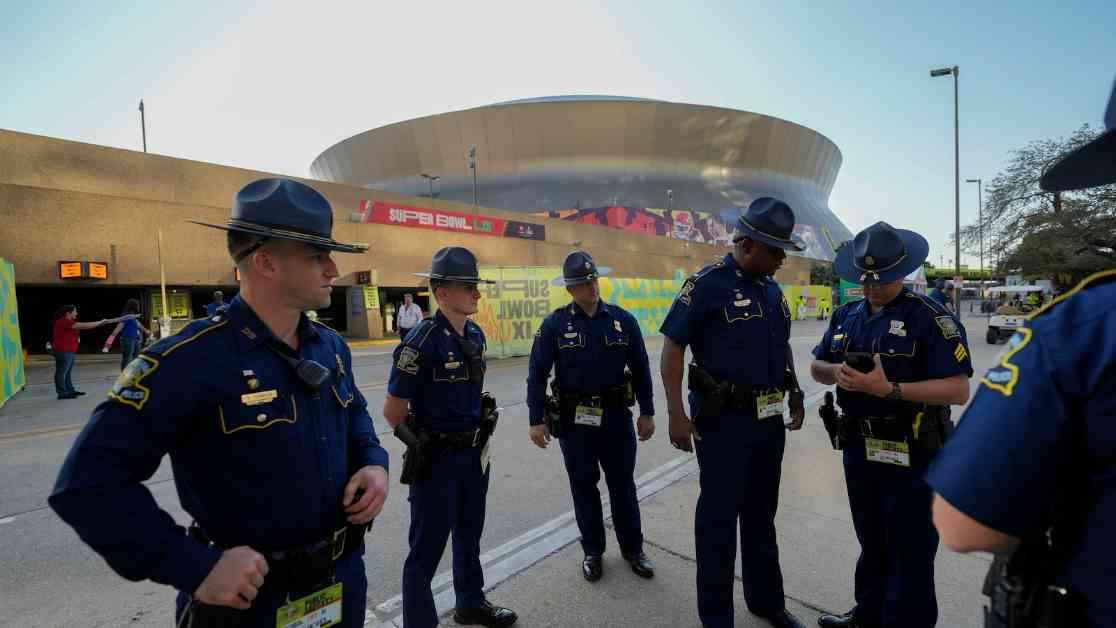The excitement surrounding Super Bowl LIX in New Orleans isn’t just about football this year. It’s about ensuring that the city can host the event safely and securely. With 10 Super Bowls under its belt, New Orleans is no stranger to hosting large-scale events. However, recent events have raised concerns about the city’s ability to provide adequate security for the estimated 100,000 visitors expected to descend on the city.
Just over a month before kickoff, a tragic terrorist attack on Bourbon Street left 14 people dead and 57 injured, shaking the city to its core. Eric Cook, an executive chef and owner of a restaurant in the city’s Central Business District, expressed the sentiment felt by many locals, saying, “New Orleans never had a reputation as a high target type place for terrorism, it was always ‘the Big Easy.’ The attack really made everyone realize we’re all vulnerable at any time. I have concerns about it, I really do.”
Adding to the heightened security concerns was the announcement that President Donald Trump would be attending the game, marking the first time a sitting president has done so. NFL Chief Security Officer Cathy Lanier assured the public that the league had adjusted its security plan in response to the attack. With over 2,700 state, federal, and local law enforcement officers expected to be present in and around the Superdome, and private drones prohibited, the NFL was taking no chances.
Heightened Threat Levels and Preparations
Amid escalating security concerns, the FBI classified the Super Bowl as a Special Event Assessment Rating (SEAR) 1 event, indicating its significance and the need for extensive federal interagency support. The agency warned of potential threats from various sources, including foreign and domestic extremist groups, lone offenders, and others with the intent to cause harm.
Eric DeLaune, a special agent in charge of Homeland Security Investigations in New Orleans, emphasized the need for increased law enforcement presence in the city leading up to the game. The FBI’s threat assessment highlighted the potential for copycat attacks, citing the use of vehicle ramming tactics and other disruptive methods. With unrest in the Middle East, unauthorized drone activity, and cyber threats looming, security officials were on high alert.
Concerns Over Security Measures
Despite efforts to bolster security, concerns lingered over certain aspects of safety preparations. The decision to allow guns while prohibiting coolers in the Bourbon Street security perimeter raised eyebrows among residents and officials. Glade Bilby, a long-time French Quarter resident, expressed his concerns, noting that the focus on one area did not address the broader safety issues faced by the city.
Louisiana’s gun laws, which permit concealed carry without a permit, posed a unique challenge for law enforcement in ensuring public safety. The Metropolitan Crime Commission President Rafael Goyeneche urged for stricter regulations, pointing out the inherent risks of allowing firearms in crowded areas. Calls for designated gun-free zones, particularly in tourist-heavy districts like the French Quarter, gained traction among local lawmakers.
As investigations into the Bourbon Street attack unfolded, questions arose about the city’s security protocols and response mechanisms. The removal of protective barriers and lapses in deploying anti-vehicle measures raised concerns about the city’s preparedness for such incidents. Louisiana Attorney General Liz Murrill pledged a thorough inquiry to identify gaps and prevent future tragedies.
In the face of adversity, New Orleans remained resilient, with businesses and residents rallying to ensure a safe and successful Super Bowl weekend. As the city braced for the big game, the focus shifted towards striking a balance between security measures and preserving the city’s vibrant spirit. While challenges persisted, the collective efforts of law enforcement, officials, and the community aimed to uphold the spirit of resilience and unity in the face of uncertainty.


